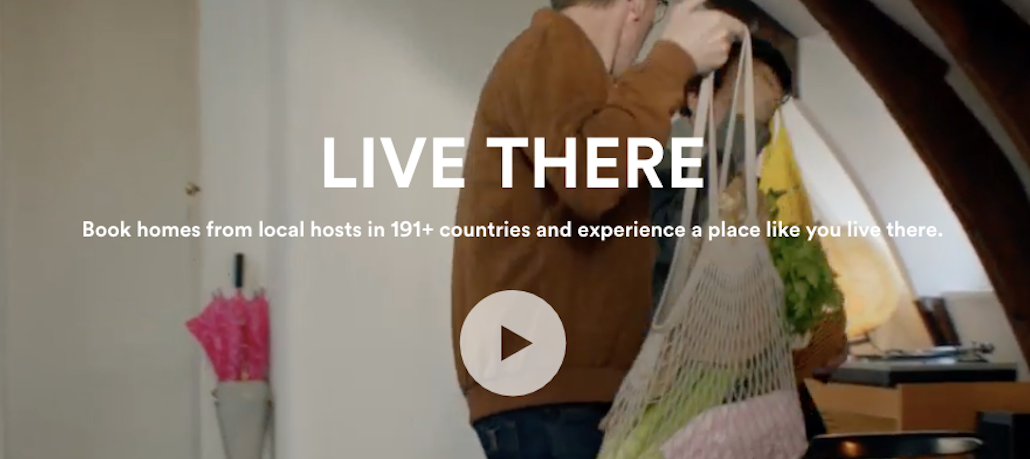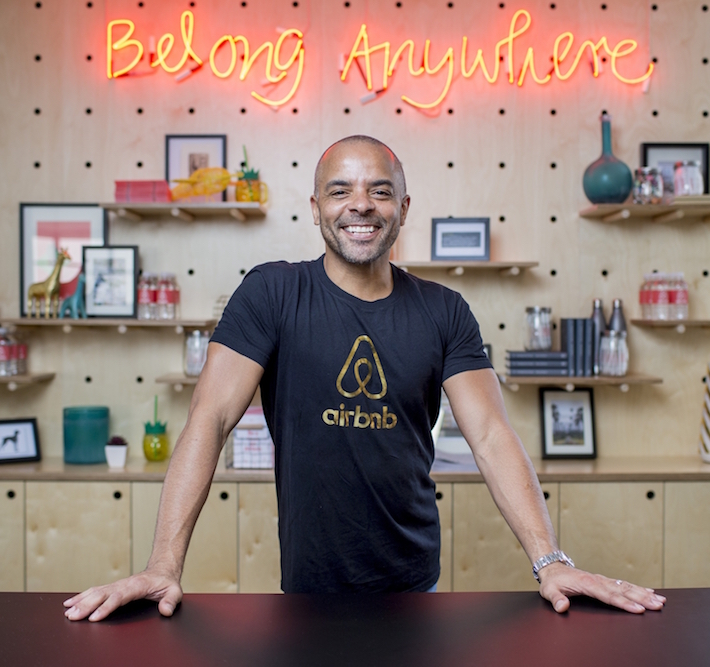Save 50% on a 3-month Digiday+ membership. Ends Dec 5.
Airbnb’s CMO: ‘I don’t want public policy messaging to bleed into our brand voice’


Airbnb is the quintessential “disruptor” brand: The short-stay service is a new option for travelers but a challenge not just to hotel chains but to municipalities and landlords alike.
When it comes to its brand message, Airbnb needs to operate on two fronts. For consumers, it presents an aspirational, community-oriented face. But for regulators, governments and opponents, it fights a political battle similar to its fellow “sharing economy” juggernaut Uber.
“Community is the most valuable power of Airbnb,”Jonathan Mildenhall, the company’s CMO, told Digiday at The Ad Club’s Advertising People of the Year event in New York City last Thursday. “I don’t want public policy messaging to bleed into our brand voice and vice versa, because they have different purposes.”
When it comes to political controversies, Airbnb takes a warm and fuzzy route with stories about the community it helps, rather than getting into an aggressive war with policymakers. For example, its new ad campaign, “Live There,” taps into Airbnb hosts and features local tips on the best tourist attractions, bars and restaurants. The message? By using Airbnb, travelers can stay at local neighborhoods, live with locals and eat local foods.
“This year, we are pushing out a universal truth that modern travel is sick and it needs a remedy,” said Mildenhall. “That remedy is Airbnb.”
Meanwhile, Airbnb is in legal and regulatory battles on several fronts. In San Francisco, where it is based, new legislation would put the onus on Airbnb to police its listings for flouting local laws. Airbnb is fighting the law. In Berlin, it’s the same story, where Airbnb is at odds with the city over requirements.
Ad position: web_incontent_pos1
On this front, Airbnb has to fight a messy political process. Doing that while taking a gauzy community-driven brand approach is hard. “At the end of the day, when we work on policy issues, we really try to find solutions that satisfy both policymakers in local cities and the community that we have,” said Mildenhall.
As the company moves at the speed of light, mistakes happen. Last November, Airbnb’s controversial bus shelter ads — that poked fun at the public library system — offended many San Francisco residents. “That was so embarrassing for me. Humanity and creativity, that campaign didn’t promote either,” said Mildenhall. “It was one of those situations where we were all so busy that the approval process just fell apart. I take the full responsibility.”
While Mildenhall thinks that brand voice and public policy messaging are separate, David Measer, group strategic planning director for agency RPA, argued that the two should be blended together because the stories that come out of the controversies are inescapably brand stories.
“The neighbors and hotel chains that are mounting opposition to the service are telling another story. Ignoring it completely seems like a poor long-term strategy,” said Measer. “I would recommend [Airbnb] to acknowledge it and give its unique side of the story.”
Either way, Airbnb has been growing rapidly. Listings on the platform increased from 500,000 homes in 2015 to more than 2.5 million to date. Meanwhile, Airbnb’s brand awareness score almost quadrupled from 10.7 in January of 2015 to 35 in June of this year, and its ad-awareness score increased from 1 to 7.9 during the same research period, according to YouGov Brandindex that surveyed 30,000 U.S. consumers.
Ad position: web_incontent_pos2
“At least based on what we are seeing from the consumer scores, consumers appear to be becoming more positive on Airbnb, and perhaps paying less attention to some of the efforts that local municipalities might be proposing to limit the company,” said Ted Marzilli, CEO of YouGov Brandindex.
When asked if Airbnb plans to bring storytelling to the next level via virtual reality, Mildenhall said that his team already experimented with this new technology but the content was not good enough to represent the brand.
“To do VR well is really expensive and you need to guarantee the distribution,” he said. “My agencies know that we should use it as a gimmick. But I don’t want to rush into VR until the production cost goes down and the distribution goes up.”
More in Marketing

Ulta, Best Buy and Adidas dominate AI holiday shopping mentions
The brands that are seeing the biggest boost from this shift in consumer behavior are some of the biggest retailers.

U.K. retailer Boots leads brand efforts to invest in ad creative’s data layer
For media dollars to make an impact, brands need ad creative that actually hits. More CMOs are investing in pre- and post-flight measurement.
Ad position: web_bfu